immigrants
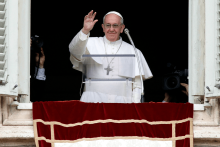
Pope Francis, born Jorge Mario Bergoglio in Buenos Aires, Argentina, was the first in a long line of 266 popes to be from South America and the first born outside of Europe since the 8th century. The pope, also the first to be a member of the Jesuit Order, was beloved by many progressive Catholics and lauded for his priorities of uplifting marginalized communities, protecting immigrants and advocating for environmental justice. According to a 2024 Pew Research Center survey, about 75% of U.S. Catholics viewed Pope Francis favorably.
But he was also a polarizing figure. He struggled to manage the ongoing sexual abuse crisis that plagued his predecessor, Pope Benedict XVI. Pope Francis met with survivors and attempted to pass reforms within the Church, but victims continue to come forward.
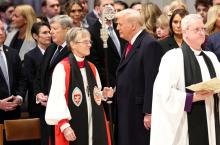
But before her sermon concluded, Budde addressed the president directly:
“Let me make one final plea, Mr. President: Millions have put their trust in you, and as you told the nation yesterday, you have felt the providential hand of a loving God. In the name of our God, I ask you to have mercy upon the people in our country who are scared now. There are gay, lesbian, and transgender children in Democratic, Republican, and independent families, some who fear for their lives.
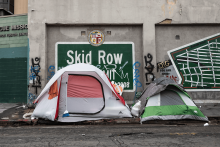
It’s an overcast Saturday morning on Gladys Avenue in Skid Row — a 54-block area in downtown Los Angeles, home to one of the country’s most stable populations of people experiencing homelessness or housing insecurity. Andrew Jiang of Alhambra, a city in western Los Angeles County, is there with a group of around 15 other volunteers with the Friars and Sisters Poor of Jesus Christ to serve chicken, rice, and vegetables to some 150 people living on Skid Row. On other days, a team of friars, nuns, and volunteers will walk block to block, distributing up to 400 sandwiches to more than 200 people.

“The Lord is my shepherd: I shall not want.”
Over the phone, Ran Limbu quotes the words of Psalm 23. He is the pastor of Christ Believer Nepali Church, a Bhutanese refugee church on the west side of Madison, Wis. This passage has come alive for him over the past decade while living in the United States of America. This verse has encouraged him to trust that God is his home even in his displacement.
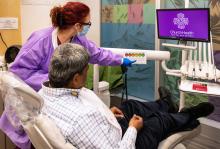
IN SEPTEMBER 1987, ordained Methodist minister and practicing physician G. Scott Morris opened Church Health, a faith-based health care center in Memphis, Tenn. The first clinic tended to 12 people. Over 35 years later, more than 80,000 different individuals have come through Church Health’s doors. When they started, Memphis was the poorest city in the country, but Morris and companions didn’t open Church Health center as an act of charity. Church Health’s mission has always been about demanding justice. His book Care: How People of Faith Can Respond to Our Broken Health System tells the story of clinics across the U.S. where people practice Jesus’ command to heal. — The Editors
I FIRST CAME to Memphis in 1986. Having completed my theological and medical education, I was determined to begin a health care ministry for uninsured people working in low-wage jobs. I had dreamed of this for years as I slogged my way through the training that would make it possible. When the time came, I chose Memphis because historically it is one of the poorest major cities in the U.S. Today we see patients in clinics for primary care, urgent care, dental work, and optometry services. Behavioral health, life coaching, and physical rehabilitation are integrated into our clinics, and we have a teaching kitchen offering classes on culinary medicine for patients and the community. The Church Health model is used in more than 90 clinics around the country. There are about 1,500 free and charitable clinics in the U.S., many of which have faith-based connections.
God calls the church to healing work. Jesus’ life was about healing the whole person, and Jesus is the church in the world. Tradition suggests that Helena, the mother of the emperor Constantine, was the first to open a hospital specifically to care for the poor. The ancient world never had a system to care for the sick who were poor until Christians offered hospitals. Even Julian the Apostate, a fourth-century Roman emperor who did not have much use for Christians, wrote, “Now we can see what it is that makes these Christians such powerful enemies of our gods, it is the brotherly love which they manifest toward strangers and toward the sick and poor, the thoughtful manner in which they care for the dead, and the purity of their own lives.” We are still Jesus’ disciples, the body of Christ running after God’s priorities in the world together. What does it look like to have a healing ministry in today’s world?

WHEN WE LOOK at the record numbers of migrants who are seeking refuge and asylum in the U.S. and the deplorable ways they have often been treated, it’s easy to lose faith. The U.S. immigration system seems so hopelessly broken, and hateful rhetoric and bad faith are so abundant among our politicians, that it can often feel as if there’s nothing we can do to fix it. Yet, if we take seriously both the Hebrew scripture command to welcome the stranger and Jesus’ call to treat migrant people as we would treat him (Matthew 25), then we cannot let ourselves succumb to despair or resignation. People who have been forced to leave dangerous conditions in their home countries to seek asylum are depending on us to not give up fighting for a fairer and more humane immigration and asylum system. Sadly, Congress has lacked sufficient political will to pass the sweeping overhaul of our immigration laws that is so sorely needed.
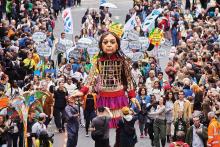
LITTLE AMAL, an 11-foot-tall puppet of a 10-year-old Syrian refugee, is the star of “The Walk,” a live public production to honor millions of displaced children in the world. Named after the Arabic word for “hope,” Amal took her first steps at the Turkey-Syria border in July 2021. Since then, she’s traversed more than 5,500 miles in 13 different countries to share a poignant plea: “Don’t forget about us.”
Four puppeteers help Amal walk. One person sits inside her torso, visible through a cage, to operate her face, head, and feet; two move her hands with external rods; and one offers balance support from behind. Amal towers over the crowds who greet her, and the enormous space she occupies sends a powerful message: Forced displacement is an urgent and collective responsibility. The Walk embodies compassion, care, welcome, and belonging — core principles of Christianity. Amal, who has more than 170,000 followers on Instagram, has become a well-recognized humanitarian symbol, reminding us that displaced people are not “aliens” or “strangers.” They are our siblings, parents, children, neighbors, and friends.

I’VE WRITTEN ABOUT immigration in these pages before, so forgive me if I seem to be repeating myself. However, any of us who spend time with the Bible know that repetition is among its most important characteristics. We get the same message over and over, until it sinks in. Here’s Leviticus 19:34: “You shall treat the stranger who sojourns with you as the native among you, and you shall love him as yourself, for you were strangers in the land of Egypt.” And here’s Leviticus five chapters later: “You shall have the same rule for the sojourner and for the native.” Everyone knows Matthew 25:35: “I was a stranger and you welcomed me.” But sometimes we forget the wonderfully hopeful verse from the letter to the Hebrews: “Do not neglect to show hospitality to strangers, for thereby some have entertained angels unawares.” Bottom line: This is clearly important work for Christians, or at least it was 2,000 years ago.
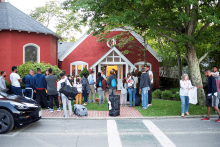
When about 50 people found themselves stranded last week on Martha’s Vineyard, the island’s nonprofit social services agency called on local churches to help. “We rallied and did what any decent human being would do if strangers showed up,” local pastor Rev. Charlotte Wright told Sojourners this week.
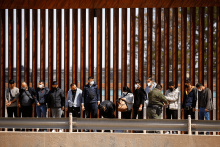
The Biden administration is fighting a legal battle to end the use of Title 42, a policy that has effectively closed the U.S. Southern Border to asylum-seekers for more than two years. Numerous faith-based organizations that work with immigrants have called on the administration to return to pre-pandemic asylum processing.
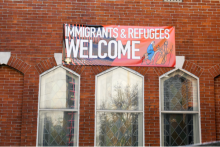
Members of Congress, led by Rep. Joaquin Castro (D-Tex.), wrote President Joe Biden a letter asking him to ensure those taking sanctuary in houses of worship would be protected from deportation. They also asked the Biden-Harris administration to lift the deportation orders against all people living in sanctuary.

For American Christians, our neighbors include — but aren’t limited to—Immigrants, both undocumented and documented, refugees, the sick, the poor, the oppressed, Iranians, Syrians, Afghanis, Yemeni, and everyone else. These neighbors are Christian and non-Christian alike, American and non-American, and there’s no exceptions based on nationality, race, creed, color, ethnicity, religion, sex, sexual orientation, or gender expression.
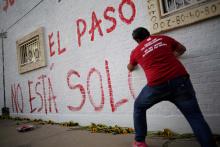
Some Latinx people have known — and others have suspected — this land is not safe for us, but the extent to which that suspicion has been confirmed in El Paso is terrifying. The perpetrator in this massacre was deliberate in his plan to counter the “Hispanic invasion.” It’s tempting to believe all this has been incited by the current president’s violent rhetoric. But while that rhetoric has added much fuel to the fire, the fire has been burning for a long time.

She’d kissed her
gently on the forehead
before setting her down
and then — just walked away.
Walked on water right out of the bay,
headed toward the ocean. She’d had enough —
seen enough, heard enough.
She wasn’t made of stone.

Now as a mother of a young adult and two teenagers, I believe it is important to share my story so that society is aware that sexual assault occurs frequently, even in Asian American communities. Just because we do not share our experiences publicly does not mean that Asian Americans are immune to sexual violence. Just because we carry the burden for decades doesn’t make our experiences untrue. Just because we do not share our stories doesn’t mean that we need to continue to live in shame.
2. What Do Survivors Need to Hear Today?
Start here: “You are beloved.” “You will recover.” “God is with you.”
3. Blocking Poor Immigrants Could Be Very Costly
“Worse health outcomes, especially among pregnant women. A jump in emergency room usage. More communicable diseases. Higher poverty and housing instability, including among U.S. citizen children. Lower productivity. Reduced educational attainment. And ‘downstream and upstream impacts on state and local economies, large and small businesses, and individuals.’ What are all these terrible things? They’re all potential consequences of a new Department of Homeland Security (DHS) rule—according to DHS itself.”
1. The Quiet Evangelical Campaign to Help Republicans Hold onto the House and Senate
The Faith and Freedom Coalition, Focus on the Family’s Family Policy Alliance, and more are stepping up their ground game — and spending millions of dollars — to stave off a blue wave.
2. This Is How #MeToo Has Moved the Needle in Churches
In 2014, protestant pastors were surveyed about how they talk about sexual and domestic violence in their congregations. Results were dismal. In 2018, after nearly a year of #MeToo revelations, the survey was conducted again — here’s what’s changed.
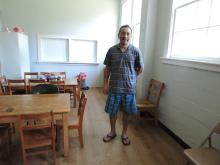
Oliver-Bruno is one of six people publicly in sanctuary in the state (a seventh doesn’t want to be identified). During the 1980s, more than 100 churches sheltered Guatemalan and Salvadoran immigrants, and the movement has seen somewhat of a national revival in recent years. Though sanctuary churches often attract media attention, the men and women living behind church doors represent a network of families and communities living under the unpredictable threat of government-sponsored raids and arrests.

Apart from slogans, nothing seems different but license plates, laws governing cell phone use in moving vehicles, and the ability to buy liquor locally. If not for signs informing you of your whereabouts, you would not know the exact state you’re in. The mimosas bloom their otherworldly silken blossoms without deference to zip code. Catalpa leaves cascade like oversized green hearts from massive branches. Steeples rise from Baptist churches alongside Dollar Generals and barbecue places named for the folksy characteristics of those who ostensibly manage the pits. Heavy’s. Bubby’s. Grateful Ed’s. All of these things, the sweet smoky same, regardless of state line
